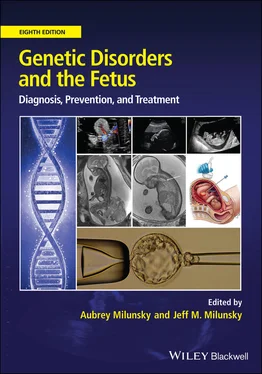Genetic Disorders and the Fetus
Здесь есть возможность читать онлайн «Genetic Disorders and the Fetus» — ознакомительный отрывок электронной книги совершенно бесплатно, а после прочтения отрывка купить полную версию. В некоторых случаях можно слушать аудио, скачать через торрент в формате fb2 и присутствует краткое содержание. Жанр: unrecognised, на английском языке. Описание произведения, (предисловие) а так же отзывы посетителей доступны на портале библиотеки ЛибКат.
- Название:Genetic Disorders and the Fetus
- Автор:
- Жанр:
- Год:неизвестен
- ISBN:нет данных
- Рейтинг книги:4 / 5. Голосов: 1
-
Избранное:Добавить в избранное
- Отзывы:
-
Ваша оценка:
- 80
- 1
- 2
- 3
- 4
- 5
Genetic Disorders and the Fetus: краткое содержание, описание и аннотация
Предлагаем к чтению аннотацию, описание, краткое содержание или предисловие (зависит от того, что написал сам автор книги «Genetic Disorders and the Fetus»). Если вы не нашли необходимую информацию о книге — напишите в комментариях, мы постараемся отыскать её.
Genetic Disorders and the Fetus — читать онлайн ознакомительный отрывок
Ниже представлен текст книги, разбитый по страницам. Система сохранения места последней прочитанной страницы, позволяет с удобством читать онлайн бесплатно книгу «Genetic Disorders and the Fetus», без необходимости каждый раз заново искать на чём Вы остановились. Поставьте закладку, и сможете в любой момент перейти на страницу, на которой закончили чтение.
Интервал:
Закладка:
Florida International University
Miami, FL, USA
President
Reproductive Genetic Innovations
Northbrook, IL, USA
Wendy P. Robinson, phd
Professor, Department of Medical Genetics
University of British Columbia
Senior Scientist
Child and Family Research Institute
Vancouver, BC, Canada
David S. Rosenblatt, mdcm, fccmg, frcpsc, faap, facmg
Dodd Q. Chu and Family Chair in Medical Genetics
Professor
Departments of Human Genetics
Medicine, Pediatrics, and Biology
Faculties of Medicine and Science
McGill University
Montreal, Quebec, Canada
Michael G. Ross, md, mph
Distinguished Professor of Obstetrics and Gynecology and Public Health
Geffen School of Medicine at University of California Los Angeles
Fielding School of Public Health at UCLA
Los Angeles, CA, USA
Co‐Director Institute for Women' and Children's Health
The Lundquist Institute at Harbor‐UCLA Medical Center
Torrance, CA, USA
Marisa E. Schwab, md
Surgery Resident
The Center for Maternal‐Fetal Precision Medicine and Department of Surgery
University of California, San Francisco
San Francisco, CA, USA
Alireza A. Shamshirsaz
Associate Professor of Surgery, Obstetrics and Gynecology
Departments of Obstetrics and Gynecology and Surgery
Baylor College of Medicine
Chief, Division of Fetal Therapy and Surgery
Co-Chief, Maternal Fetal Surgery Section
Texas Children's Fetal Center
Texas Children's Hospital
Houston, TX, USA
Lee P. Shulman, md, facmg, facog
The Anna Ross Lapham Professor in Obstetrics and Gynecology
Feinberg School of Medicine of Northwestern University
Medical Director, Insight Medical Genetics
Medical Director, Reproductive Genetic Innovations
Chicago, IL, USA
Andrea Superti‐Furga, md
Professor of Pediatrics
University of Lausanne
Head, Division of Genetic Medicine
Lausanne University Hospital
Lausanne, Switzerland
Jan Traeger‐Synodinos, dphil (Oxon), erclg
Professor of Genetics
Director of the Laboratory of Medical Genetics
National and Kapodistrian University of Athens, Greece
Sheila Unger, md, frcpc
Chief
MER1 Division of Genetic Medicine
Lausanne University Hospital
Lausanne, Switzerland
Ignatia B. Van den Veyver, md
Professor of Obstetrics and Gynecology and Molecular and Human Genetics
Baylor College of Medicine;
Director of Clinical Prenatal Genetics
Texas Children's Hospital
Houston, TX, USA
Daniel L. Van Dyke, phd
Professor of Laboratory Medicine and Pathology
Mayo Medical School and Mayo Clinic Cytogenetics Laboratory
Rochester, MN, USA
Liesbeth van Leeuwen, md, phd
Associate Professor
Department of Obstetrics
Amsterdam Reproduction and Development Research Institute
Amsterdam University Medical Centers
University of Amsterdam
Amsterdam, The Netherlands
Yves G. Ville, md
Professor of Obstetrics and Fetal Medicine
Head of Department of Obstetrics and Fetal Medicine
Hôpital Necker‐Enfants Malades, GH Paris‐Centre
Université de Paris
Paris, France
Gerard Vockley, md, phd
Professor of Pediatrics and Human Genetics
Cleveland Family Endowed Professor of Pediatric Research
Department of Pediatrics
University of Pittsburgh School of Medicine and Graduate School of Public Health
Chief, Division of Medical Genetics
Director, Center for Rare Disease Therapy
Children's Hospital of Pittsburgh
Pittsburgh, PA, USA
Ronald J.A. Wanders
University of Amsterdam, Academic Medical Center
Departments of Clinical Chemistry and Pediatrics
Emma Children's Hospital
Laboratory of Genetic Metabolic Diseases
Amsterdam, The Netherlands
Hans R. Waterham, phd
Professor, Functional Genetics of Metabolic Diseases
Departments of Laboratory Medicine and Pediatrics
University of Amsterdam
Academic Medical Center
Laboratory for Genetic Metabolic Diseases
Amsterdam, The Netherlands
David Watkins, phd
Research Associate
Department of Human Genetics
McGill University
Scientist
Division of Medical Genetics, Department of Specialized Medicine
McGill University Health Centre
Montreal, Quebec, Canada
Bryan G. Winchester, ma, phd
Emeritus Professor of Biochemistry
ULC Great Ormond Street Institute of Child Health
University College London
London, UK
Aline Wolter, md
Justus‐Liebig‐University, Giessen
Department of Obstetrics and Gynecology
Division of Prenatal Medicine and Fetal Therapy
University Hospital
Giessen, Germany
Ellen Wright Clayton, md, jd
Craig‐Weaver Professor of Pediatrics
Professor of Law
Center for Biomedical Ethics and Society
Vanderbilt University
Nashville, TN, USA
1 Genetic Counseling: Preconception, Prenatal, and Perinatal
Aubrey Milunsky 1,2 and Jeff M. Milunsky 1,2
1Center for Human Genetics, Cambridge, MA, USA
2Tufts University School of Medicine, Boston, MA, USA
The time is fast approaching when virtually all the culprit genes and their mutations for >7,000 rare monogenic disorders 1will be known. Thus far, causal single genes and their mutations have been determined for 5,673 genetic disorders, 2enabling preimplantation genetic testing or prenatal genetic diagnosis. These advances using chromosomal microarrays, whole‐exome sequencing and even whole‐genome sequencing together with fetal imaging and noninvasive prenatal testing, expand the era in which all couples have the option of avoiding or preventing having children with irreversible, irremediable, crippling, or lethal monogenic disorders. Primary care physicians, and those in all medical specialties, will need to inform their patients of this key option. This imperative is already partly in current practice. Missing is the requirement of physicians to request and obtain the precise name of the genetic disorder in question or an existing DNA report on a family member, for prospective parents to benefit from available options.
Increasingly, couples are seeking prenatal diagnosis for adult‐onset genetic disorders in which mutations have been determined. Huntington disease prenatal diagnosis has been in the vanguard for many years, but now there are requests for adult‐onset dominantly transmissible disorders including breast and other malignancies, frontotemporal dementia, neurodegenerative disorders, and cardiomyopathies. The remarkable advances in genetics provide a cogent need to confer and refer. Physicians should not invite legal purview for a failure to inform, offer, refer, or provide genetic testing.
In context, couples at risk for having progeny with abnormalities expect to be informed about their risks and options, optimally during preconception counseling. Their concerns are serious, given the significant contribution of genetic disorders to morbidity and mortality in children and adults.
The burden of genetic disorders and congenital malformations
A conservative estimate for the world population prevalence of rare diseases (71.9–80 percent considered as genetic) is 3.5–5.9 percent, equating to 263–446 million individuals affected at any point in time. 3 , 4In India, which has a quarter of the world's neonatal deaths (an estimated 753,000 in 2013), about 9 percent were due to congenital anomalies. 5An estimated 7.9 million infants worldwide are born each year with a major congenital malformation according to a report in 2013. 6The likelihood of having a child with a congenital malformation varies from 2 to 10 percent 7due to multiple factors that complicate efforts to accurately diagnose and determine the incidence or prevalence of congenital anomalies or genetic disorders. Box 1.1lists the majority of known etiologic categories, discussed below, which help explain sometimes striking differences among major studies. It is almost impossible to account for all these potentially confounding factors in a study, and rarely has any one study come close. Of the >7,000 rare genetic disorders, about 1 in 12 to 1 in 16 individuals are affected, 1aware or unaware. Given a world population of 7.6 billion, an estimated 473 million are likely to have a rare disease. 1More than 4,331 genes with phenotype‐causing mutations have been identified, including 6,739 phenotypes with a known molecular basis. 2Severe intellectual disability is considered to be largely genetic in origin 8 , 9with a global prevalence between 0.5 and 1.0 percent. 10Despite continuing progress in the discovery of genes causally related to neurodevelopmental delay, 11in less than 40 percent of cases is there a definitive recognition of cause. The European Organization for Rare Diseases maintained that about 30 percent of all patients with a rare disease died before the age of 5 years. 12In the United States in 2013–2014, congenital malformations, deformations, and chromosomal abnormalities accounted for the most infant deaths – 4,746 (20.4 percent) out of 23,215 – in any category of causation. 13
Читать дальшеИнтервал:
Закладка:
Похожие книги на «Genetic Disorders and the Fetus»
Представляем Вашему вниманию похожие книги на «Genetic Disorders and the Fetus» списком для выбора. Мы отобрали схожую по названию и смыслу литературу в надежде предоставить читателям больше вариантов отыскать новые, интересные, ещё непрочитанные произведения.
Обсуждение, отзывы о книге «Genetic Disorders and the Fetus» и просто собственные мнения читателей. Оставьте ваши комментарии, напишите, что Вы думаете о произведении, его смысле или главных героях. Укажите что конкретно понравилось, а что нет, и почему Вы так считаете.












